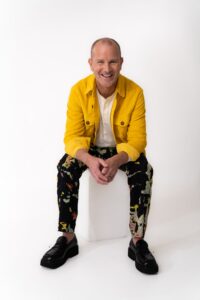 Connect & Grow: Paul Wolfe
Connect & Grow: Paul Wolfe
I’m thrilled to introduce you to my friend, Paul Wolfe, the former SVP/Head of HR at Indeed, who guided the company’s growth from a few hundred to over 12,000 employees, all while championing culture, employee engagement, and diversity.
Paul continues to shape the HR field as an author, board member, and venture advisor, advocating for a ‘Human First’ leadership approach. In addition to all that trailblazing work, I’m a gigantic fan of his vlogcast.
I’ve spent some time with Paul in real life and on Zoom, and I’m touched by how he recognizes the accomplishments of others and is quick to praise people for their strengths. He’s a genuine, thoughtful, and completely kind human being who is definitely someone you should know.
Hope you enjoy the interview!
Here’s Our Interview
LR: Welcome, Paul. Your reputation as a Human First Leadership Advocate precedes you. I’m eager to learn about what led you down this path. What inspired you to start this journey, and how do you promote this philosophy in the workplace?
PW: My inspiration comes from over two decades of experience in the HR sector with companies like Match.com, Conde Nast, and, most recently, Indeed. The challenging COVID era brought into stark focus a fundamental truth that I had been aware of throughout my career: beyond our titles and complex management theories, we are all Human Beings First.
Leaders who create and participate in an environment where individuals feel valued, seen, heard, and safe being themselves foster a more engaged and loyal workforce.
I’ve chosen to promote this philosophy through my book, “Human Beings First – Practices for Empathetic, Expressive Leadership,” by advising companies at various stages of development, acting as a board member through my 52 Humans vlogcast, and speaking at conferences and organizations. I want to inspire leaders to transform their workplaces by introducing more empathy and humanity in their day-to-day actions.
LR: That’s fascinating. Can you tell us more about the empathetic, expressive leadership principles outlined in your book “Human Beings First”?
PW: Absolutely. In my book, I introduce eight principles of empathetic leadership: Reflect, Share, See, Listen, Care, Connect, Help, and Protect. At the core of all these principles is viewing employees as human beings with beautifully diverse, complex, and challenging lives.
Leaders must understand that their employees could be dealing with many personal challenges, from caring for an aging parent, coping with grief, and mental health challenges, to raising kids. In doing so, leaders can embody empathy and vulnerability. Also, leaders must remember that they are also human beings first. If they show up authentically, they’ll cultivate deeper connections with their teams, resulting in a more engaged, loyal workforce and a culture of psychological safety.
LR: You’ve been open about your struggles with mental health during the COVID pandemic. How did sharing this experience with your co-workers at Indeed impact your leadership style and the company’s culture?
PW: Yes, I was diagnosed with OCD in 2005, and the pandemic forced it to manifest in different ways. I struggled to find the proper medication, and during that period, I wasn’t always at my best during meetings or sessions with my team.
In August 2020, I decided to share my ongoing struggles with OCD in my weekly email to the team. The response was overwhelming. I received over 400 messages from employees showing care, support, and sharing their experiences with mental health. This episode made me realize the power of vulnerability. It allowed us to take another step toward normalizing the conversation around mental health.
LR: How can leaders create an environment that values and appreciates their employees’ full selves and fosters personal and professional success?
PW: Leaders can create such an environment by prioritizing open and honest communication, providing opportunities for personal and professional growth, embracing work/life integration, offering flexible work arrangements, recognizing and rewarding employees for their contributions, and promoting a culture of inclusivity and belonging. By doing so, they can foster a workplace that supports employee well-being, development, and success while creating a positive and productive work environment.
LR: What role does shared vulnerability play in building workplace cultures based on authentic connection and purpose-led performance?
PW: Absolutely, Laurie. When individuals are open about their struggles, fears, and mistakes, it fosters an environment where everyone can be their authentic selves without fear of judgment or retribution. In addition, this openness promotes stronger relationships, improved communication, and a more collaborative and supportive work environment, all of which lead to better performance and outcomes.
LR: Where do you envision the HR industry in 5 years?
PW: I hope the HR industry recognizes that many of the processes we’ve relied on for decades aren’t necessarily the best fit for our current or future workforce. We need innovative disruption of these tried-and-true processes to evolve how we support our employees, handle grievances, manage performance, and more—all through a human-first lens. The goal is to create a workplace where people feel genuinely valued and seen, where their voices matter, and where they can bring their full selves to work each day.
Connect & Grow
If you liked my interview with Paul, please connect on LinkedIn and check out his new book and vlogcast. I’m a big fan of his work, and I know you will be, too!
You must be logged in to post a comment.